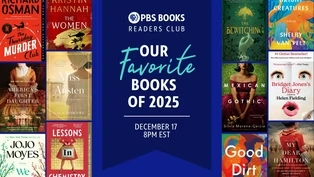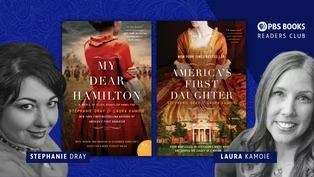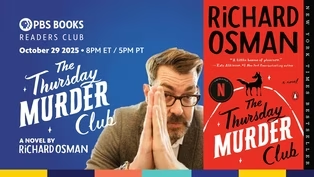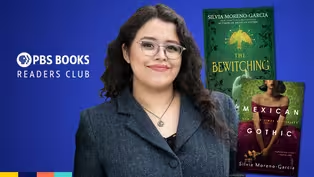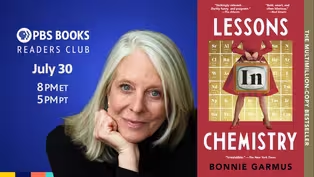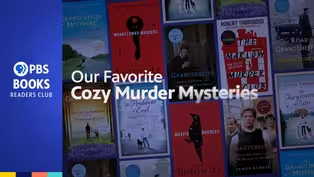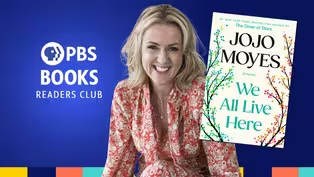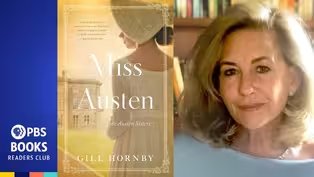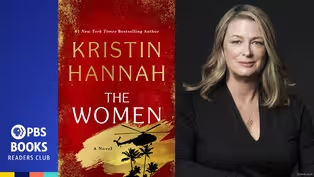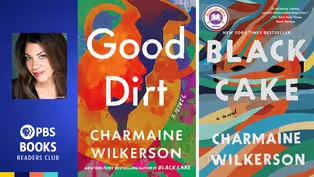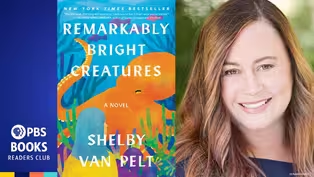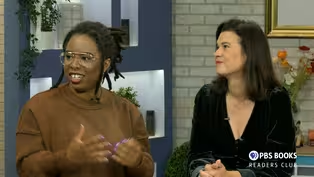
Readers Club | Ep. 208: Helen Fielding | Bridget Jones's Diary
Season 2025 Episode 53 | 59m 30sVideo has Closed Captions
PBS Books Readers Club welcomes beloved British author Helen Fielding to discuss her iconic novel
PBS Books Readers Club welcomes beloved British author Helen Fielding to discuss her iconic novel Bridget Jones’s Diary—a clever, laugh-out-loud reimagining of Pride and Prejudice through the eyes of a hilariously imperfect modern heroine. As we celebrate Jane Austen’s 250th birthday, there’s no better time to revisit Fielding’s wildly popular twist on the Mr. Darcy love story.
Problems playing video? | Closed Captioning Feedback
Problems playing video? | Closed Captioning Feedback

Readers Club | Ep. 208: Helen Fielding | Bridget Jones's Diary
Season 2025 Episode 53 | 59m 30sVideo has Closed Captions
PBS Books Readers Club welcomes beloved British author Helen Fielding to discuss her iconic novel Bridget Jones’s Diary—a clever, laugh-out-loud reimagining of Pride and Prejudice through the eyes of a hilariously imperfect modern heroine. As we celebrate Jane Austen’s 250th birthday, there’s no better time to revisit Fielding’s wildly popular twist on the Mr. Darcy love story.
Problems playing video? | Closed Captioning Feedback
How to Watch PBS Books
PBS Books is available to stream on pbs.org and the free PBS App, available on iPhone, Apple TV, Android TV, Android smartphones, Amazon Fire TV, Amazon Fire Tablet, Roku, Samsung Smart TV, and Vizio.
Providing Support for PBS.org
Learn Moreabout PBS online sponsorshipMore from This Collection
The PBS Books Readers Club is a monthly digital-first series that brings its members into conversations behind the stories of your favorite books & shows. You can watch the online on the PBS App, with extended interviews available for PBS members on PBS Passport.
Readers Club | Ep. 212: Our Favorite Books of 2025
Video has Closed Captions
PBS Books Readers Club celebrates the wrap of its second season with a highlight of 2025 (47m 55s)
Readers Club | Ep. 211: America's First Daughter | Stephanie Dray & Laura Kamoie
Video has Closed Captions
PBS Books Readers Club welcomes co-authors Stephanie Dray and Laura Kamoie (1h 1m 45s)
Wed Oct 29 2025 | Readers Club | Ep. 210: Richard Osman | Thursday Murder Club
Video has Closed Captions
PBS Books Readers Club welcomes celebrity writer Richard Osman to discuss his best-selling novel (52m 44s)
Readers Club | Ep. 209: Silvia Moreno-Garcia | The Bewitching and Mexican Gothic
Video has Closed Captions
PBS Books Readers Club welcomes award winning author Silvia Moreno-Garcia to discuss her new book. (52m 42s)
Readers Club | Ep. 207: Lessons in Chemistry | Bonnie Garmus
Video has Closed Captions
PBS Books Readers Club welcomes international best-selling author Bonnie Garmus to discuss her novel (49m 3s)
Readers Club | Ep. 206: Our Favorite Cozy Murder Mysteries
Video has Closed Captions
PBS Books Readers Club hosts a special event sharing Our Favorite Cozy Murder Mysteries (52m 32s)
Readers Club | Ep. 205: We All Live Here | Jojo Moyes
Video has Closed Captions
PBS Books Readers Club welcomes international & New York Times best-selling author Jojo Moyes (57m 37s)
Readers Club | Ep. 204: Miss Austen | Gill Hornby
Video has Closed Captions
PBS Books Readers Club welcomes international best-selling author Gill Hornby to discuss her novel (51m 18s)
Readers Club | Ep. 203: The Women by Kristin Hannah
Video has Closed Captions
PBS Books Readers Club welcomes international best-selling author, Kristin Hannah to discuss novel. (53m 29s)
PBS Books Readers Club | Ep. 202: Good Dirt & Black Cake | Charmaine Wilkerson
Video has Closed Captions
PBS Books Readers Club is delighted to welcome critically acclaimed author Charmaine Wilkerson (55m 29s)
PBS Books Readers Club | Episode 201 | Remarkably Bright Creatures | Shelby Van Pelt
Video has Closed Captions
PBS Books Readers Club launches season two with award-winning author Shelby Van Pelt. (57m 40s)
Readers Club | Our Favorite Books of the Year
Video has Closed Captions
PBS Books Readers Club | Our Favorite Books of the Year (51m 53s)
Providing Support for PBS.org
Learn Moreabout PBS online sponsorship(upbeat music) - In the same way Bridget is about the gap between how people feel they're expected to be and how they actually are.
"Pride and Prejudice" is about, I think, the powerlessness economically of women at that time, that all they could do was choose to say no to a proposal.
(upbeat music) - Well, hi and welcome to the "PBS Books Readers Club."
- Today, we're thrilled to welcome New York Times bestselling author, Helen Fielding to talk about her international phenomenon, "Bridget Jones's Diary."
- Originally inspired by "Pride and Prejudice," "Bridget Jones's Diary" reimagines the classic love story through the lens of a woman of the 90s, navigating life, love, and unrealistic resolutions.
- It's satirical, sharp, and full of heart, poking fun at the pressures women face to have it all while capturing the universal awkwardness of trying to grow up gracefully.
- Well, as we celebrate Jane Austen's 250th birthday this year, Bridget Jones offers a fresh, funny way to revisit the timeless appeal of Mr. Darcy, and a perfect pick that's both a lighthearted summer read and a social satire that gives us plenty to talk about.
Hi, I am Fred Nahhat, here with Lauren Smith, joined by literary expert and award-winning writer, Princess Weekes and our resident librarian and PBS Book's National Director, Heather-Marie Montilla.
- Before we delve into this book, we want to hear from you.
Share your thoughts on "Bridget Jones's Diary" in the comments, have you read it yet?
Seen the movie a hundred times?
We love reading and responding to your comments in the chat.
You can also pose a question for other readers, book clubs are so much more fun when we all get involved.
- Well, and be sure to join the PBS books Readers Club Facebook group to connect with other book enthusiasts, share recommendations, and discuss your favorite reads all month long, - It's the best book club ever.
These folks give amazing recommendations.
Great stories are meant to be shared, so click share on Facebook or YouTube right now.
Friends, do not let friends miss out on great books and your support, it means the world to us.
- All right, so let's discuss Helen Fielding's charming novel, "Bridget Jones's Diary," what did everybody think?
- It is a great summer read.
It is light, it is fun, it's a cultural icon.
This book is a cultural icon, for all of us actually.
- [Fred] Yeah.
- I think when I think about the unique writing style of the time, how revolutionary it was and then really, it echoes for so many of us our life.
And then where are we today.
I'm like, I'm just interested to get into it and where the inspiration came from.
- Absolutely, like as you know, I'm a huge fan of Jane Austen.
I love "Pride and Prejudice," and so it was so fun getting to really focus on the similarities between the source material and this, especially in the choice to sort of make Bridget's mother, Lydia and Mrs. Bennet at the same time.
- [Heather-Marie] Yeah, yeah.
- It blew my mind of watching that entire thing unfold.
And just like Jane Austen sometimes gets reduced and we forget that it's a satire and really touching on the issues that women face at the time, I feel the same way at Bridget Jones.
I felt like at the time, I don't think people really understood how toxic that era was for young women in terms of body culture.
And I think people took it at face value and not seeing that it was really critiquing those ideas.
And I think calling it, chick lit sort of demeans the fact that like, no, she had a perspective that she was really highlighting and I think her and Jane both have that on lock.
- Yeah, I love that.
- Well, they say that good writers borrow, great writers steal, extraordinary writers sample Jane Austen proven once again in this book that goes back a number of years, but it's so much fun to reconsider it, to reflect on it.
This is a book that I'm really looking forward to getting into with the author.
- Well, it is really fun to compare "Pride and Prejudice" and "Bridget Jones."
And you know, like you said, there are some critiques of the work looking back on it.
- [Fred] Yeah.
- You know, we don't want our 30-year-old women talking about their calories in their journal, that's not the number one thing that we're thinking about.
- [Princess] Yeah.
- But it is a reflection of the time.
And it also speaks to the format of the book because it is written as a diary.
- [Heather-Marie] Yes.
- [Princess] Right.
- [Lauren] Which is really interesting.
And you write different things in your diary - [Princess] Absolutely.
- [Lauren] than you put on your social media, right?
- [Princess] Right.
- And I think it's just a unique spin on a novel and getting like really into the little things that are going on in your head that you might not want everybody to know about.
- [Princess] For a good reason.
- I think it's really smart.
- [Princess] Exactly, I agree.
- It's brilliant, brilliant.
Well, the other thing about me being from the 90s, it's important to reflect and to reconsider, but also these villains, no matter what century they're in, they kind of throw off- - Daniel, Wickham Daniel.
- The same gross vibe, right?
- Yes, icky.
- So it's a universality of gender politics.
And your point about the 90s is so key 'cause that's what it was, that was the zeitgeist.
- [Lauren] Yeah.
- We lived through it and working to change through that.
- Yeah, it's a truth, universally acknowledged that it sucks to be a woman sometimes.
- [Lauren] It's hard.
- [Heather-Marie] It is.
- Jane knew it and Helen knows it.
- Exactly.
- And we know it, yes.
- But we love you, Fred.
- Well, I appreciate that.
Author Helen Fielding is standing by to join us in just a moment to talk more about Bridget Jones.
But first, let's talk about how you can join the conversation.
Sign up for our PBS Books e-newsletter at pbsbooks.org/subscribe.
There you will find exclusive book recommendations, author interviews, and so much more.
It's the best way to get the latest book updates right into your inbox.
- And did you know that our PBS Books YouTube channel features hundreds of author interviews and fascinating literary stories.
Geraldine Brooks, Percival Everett on his Pulitzer Prize winner, "James."
Kristin Hannah on "The Women."
Shelby Van Pelt on "Remarkably Bright Creatures."
Our book friends are all there on YouTube.
If you haven't already, be sure to subscribe.
- And if you love the PBS Books Readers Club, consider supporting your local PBS station now more than ever, this program and your PBS station are counting on support from viewers just like you and me.
So please, if you can, visit pbsbooks.org/donate to make a gift.
- [Lauren] Pbsbooks.org/donate will take you right to your local stations giving page there among many other thank you gift options.
You can support PBS Books directly by selecting one of our special gifts like the PBS Books Readers Club book bag.
I love this thing, it has a zipper so that it's very safe to carry around.
You can put so many books in it, you can haul it home from the library.
It is amazing, it's so cute, it's got a shoulder strap or you can use it as a handbag.
I should be on QVC at this point.
I just, I love this thing.
It's stylish, it's durable, and it's your new go-to sidekick for toting all your latest reads, eReader, laptop, and whatever else your literary adventures require.
And it's even got a logo so you can support your love for public media.
- [Fred] We also have the official PBS books Readers Club mug, just like the one we have right here on the set, it says, "My weekend is booked."
And of course, isn't that the truth?
- Ah yeah, it's definitely the truth, every weekend.
- The fun doesn't stop there because as a PBS member, you get access to PBS Passport, the member exclusive section on the free PBS app, where you can stream full seasons of incredible PBS shows, including, Jane Austen inspired favorites like "Miss Austen," which tells the story of Jane's sister, Cassandra and why she burned all those letters.
"Death comes to Pemberley," which imagines what happens to Elizabeth and Mr. Darcy when their happy marriage is brought to an abrupt halt after a murder takes place at Pemberley.
And of course, "Sanditon," based on Jane Austen's final and unfinished novel.
And now, let us welcome in our guest author, Helen Fielding.
Welcome to the PBS Books Readers Club.
- Hi, it's lovely to be here.
- Well, it's been almost 30 years since you first wrote and released "Bridget Jones's Diary."
Take us back to the beginning, how did the idea for Bridget and her character come to be and what's it like looking back on this 30 year journey?
- Well, it was all quite a surprise really, because I'd been trying to be an earnest literary novelist and I'd written a novel set in a refugee camp in the Sudan.
And I was trying to be a political journalist on the Independent in London and working on the political desk, but I was also single in my 30s.
And they wanted me to write a column as you know, single life in your 30s.
And I said, no, no, no, that is embarrassing, but I will make someone up.
So we just did it completely spontaneously.
We took a picture of the girl who was working as a assistant in the office, we sort of banged it up that day.
I already kind of had the voice because I'd been playing with this character for a while.
I didn't tell anyone it was me.
The only person who knew was my editor and I assumed, they'd stock it after six weeks, but I would get some money to pay the rent.
And so it was a complete surprise that people started writing letters and enjoying it.
And one of my best friends told me about the column and I said, "What do you think?"
She said, "I think it's funny."
And so I was like, "Yay."
And I said, "Tracy, I wrote it."
And then ever since, I've been boasting about the column, but I think it was the fact that I didn't think anyone was gonna read it, that allowed me to be emotionally honest in a way that I wouldn't have been otherwise.
I would've been self-conscious.
- Kind of like when you write a diary.
- Exactly.
- And think, anyone will read it.
- That's perfect, exactly.
And I think the framing of the diary is one of the most interesting things about just how it's all put together, that personal touch of knowing who Bridget is.
So I kind of was wondering, how did you keep the form of a diary while still telling the story of "Pride and Prejudice?"
Were there any sort of like structural limitations that you were coming up against that you had to work around when coming up with the book?
- Well, really, it wasn't meant to be a book, you see, it was just meant to be a column for a short time.
And I was writing another rather, this tone about sort of about economic and cultural divides in the Caribbean.
And my publisher took me out for a drink and we got a bit plastered and she said, "This book is unreadable, Helen."
It was a second book in my second book deal.
And I said, "Yeah, I know."
She said, "Why don't you do "Bridget Jones" instead?"
And I said, "Yeah, okay."
It was as casual as that, but all I had was all these columns and no structure.
So the BBC was showing "Pride and Prejudice" at the time, and I, like the rest of the country was in love with Colin Firth.
So he started being in the columns.
And then I thought, well, why don't I just steal the plot from "Pride and Prejudice?"
So I don't think Jane Austen would mind in anyway, she's dead because it's a really, really good plot.
I mean, it's been adapted so many times and you know, there's "Pride and Prejudice" and "Zombies" and "Mr. Darcy, the Vampire," and however times it gets reinvented that plot, it pretty much always works.
It's very much a foolproof plot.
So it wasn't that hard to follow.
I mean, there is a bit in "Pride and Prejudice" where Darcy disappears, but it is a bit tricky when you lose your through line like that.
But apart from that, I thought it was fine.
You know, Daniel was Wickham, Darcy was Darcy, Bridget was Elizabeth Bennet, you know.
I was happy, grateful, and still am to the plot.
- Well, taking it to the present day, understanding the through line and the impetus from Austen.
In 1996, I think I was 32, I have four sisters, I understand all this vulnerability, like it captured that moment, I think what was revolutionary about it was, even though it was a different time, it was exposing that vulnerability.
And I have to be honest, the diary entries make me wanna smoke.
- No, don't start now.
- [Princess] Yeah.
- I'm telling you, it captures that, it captures that essence.
So blending the zeitgeist of the time in the 90s, I guess with that Austen sensibility, how were you able to navigate that process and why do you think that Austen's influence just keeps people coming back?
- Well, I think the thing about Jane Austen is that it is her 250th anniversary this year.
She was just very, very, very good at being a novelist, I mean, she wrote the original version of "Pride and Prejudice" when she was 17.
And it was just innate.
She knew about plot, she knew about character, she knew about dialogue, she knew about theme.
I always think the thing that elevates a book from just another novelist, what is it actually about beyond plot and the story, what is it about?
In the same way Bridget is about the gap between how people feel they're expected to be and how they actually are.
"Pride and Prejudice" is about, I think, the powerlessness economically of women at that time.
That all they could do was choose to say no to a proposal unless they have their own money, they just sat and waited to be asked.
And you know, it was a pretty boring and pretty powerless position.
So I think she manages to tell you a very entertaining love story, but she's so much more than a romantic novelist.
Happy endings are just about where you choose to stop the story.
She picks that little slice to make it a good narrative, but she's actually telling you a huge amount about the political situation, the sociological situation and human nature, she's very funny.
- I remember talking with, we interviewed Gill Hornby, who wrote, "Miss Austen," and she put it so perfectly like Jane Austen in that time, for a woman to say no to a proposal, like Mr. Darcy, like marriage wasn't really romance, it was a rescue.
- Yeah, exactly.
- That's how she put it.
- Yeah, yeah, yeah.
- And so it was revolutionary, this idea to- - Have your own autonomy in that choice.
- Yeah, yeah.
- And she says no twice to like two very viable candidates because she just wants love.
- So I know Fred talked about how important this book and how revolutionary this book was.
I was 17 when this book came out.
And it's really interesting because, you know, tracking your weight, thinking you're too fat, tracking how many drinks you had, all of that, I feel was very much my life when I first read the book.
And it's so different reading it at 40, let's say, 45.
- 45 it is.
- 45 it is.
My daughter thinks I'm 29, I think.
But all of that being said is because part of it is perspective because as I read it, now I'm like, "Oh my gosh, it's body shaming."
And then I started thinking about maybe, has society changed?
And what I wanna ask you is, if you were writing "Bridget Jones," the original, now.
- As a 30-year-old.
- Yes, as a 30-year-old, how would it be different?
What would you put in it to make it different?
- Well, it's quite hard to answer that because the best advice I had about writing was write about what you know.
And I don't know what it's like to be a 30-year-old now.
I know more about what it's like to be a Gen Z now because my kids are that age.
And what I do know is that there is quite a big Gen Z audience for Bridget.
And when I go (indistinct) or something, probably 40% of the audience is 18 to 25 year olds coming with their mom.
I think there are a lot of reasons why they are identifying with Bridget.
I think that they're the first generation since the Second World War generation to live through seeing the world fall apart.
So there're already quite aware and sort of shaken and fragile.
And so I think partly as a result of that, they're much more willing to share emotionally with each other, their vulnerabilities, and their need for companionship.
Their need for the ability to laugh at yourself, the need for community.
And just as Bridget had her cozy rituals with Bridget, it was boba and ice cream and sitting on the sofa in a little group of friends.
With the Gen Z's, it's all matcha and potions and protein powder and magnesium salts.
You all have sort of, you know, the bunny ears and the slippers and the PJs and the friendship groups.
And I think the body image thing is so much more difficult for them because they have social media that they're faced with all these filtered people, but on top of that, they have the shame that they shouldn't be worrying about it in the first place because of the body positivity movement.
- [Lauren] Right.
- [Princess] Right.
The contradictions.
- [Lauren] At least, Bridget didn't have that.
- [Princess] Yeah.
And having to like, you know, deal with that, yeah.
- Yeah, so I think, I love the fact that they come to readings and they want to talk and ask about Bridget.
And I love the fact that they relate to her, to her emotional honesty, I think.
- Well, as someone who is single in their 30s, I can say that there's a lot of overlap still.
I think that's kind of also the "Pride and Prejudice" through line it is.
They're like, "Well, you're getting up there, when are you gonna get married?
When are you gonna settle down?"
I think that's kind of like the ultimate universality of like, you know, your eggs are gonna start crackling soon and I think reading it now, like when I first watched "Bridget Jones" and read the book, I was much younger now.
And I was like, "I have so much time," and then all of a sudden, I'm here at 33, like I like myself so much better.
I like am so much happier.
But some voice in my head, society is telling me like, "But are you happy, if you don't have a partner?"
And I think that's kind of what this book does.
It touches on that inner voice that's kind of telling you like, "You're doubting yourself," but then you question it because when she does lose weight, everyone's like, "But I thought you looked better before."
- [Lauren] Yeah, she does.
- And it's just like.
- I feel like a scientist whose entire life's work has been a mistake because when she lost weight, everyone thought she looked tired and old.
But I hope that it did change things a bit.
You know, there is this notion of the singleton, like a valid notion of why women would be single in their 30s.
And also honestly, like with the new movie, I was really trying to talk about community and how it's your friends that get you through.
Because this idea that you are supposed to live with one other person and some children in a single-unit building, I don't quite know why people think that is the norm because it isn't, it's not what everyone does or what you should necessarily aspire to.
Because when I look at the people around me, it's not even 50/50.
I think more people that I know are single or you know, single mothers or a slightly sort of mixed up family than living in those normal old-fashioned units.
So we're all kind of conditioned to think, that's what we should be doing.
But it's sort of nonsense, really.
- As a parent, right, a lot of this book centers on a parent's expectations of their daughter.
And I wanted to ask about your expectations or on your kids and basically, how writing the book influenced your expectations or your consciousness of your expectations on your children.
- Well, there's a scene that I've tried and tried to get into the movies and one day, I will get it into a movie or maybe, the musical, if I make the musical, there's a scene where Bridget confronts her mom and says, "Why do you keep trying to change me?
Why are you always saying, you're wearing the wrong thing, you're doing the wrong thing.
You're living in the wrong way.
I just want you to support me."
And the mum sort of cracks and says, "Oh Bridget, I'm sorry, I'm so very sorry."
And then they sort of really, really know each other properly.
And I think, I suppose as I've got older with Bridget, I understand the mum's perspective better and I think Bridget's mum grew up in an age where she wasn't bombarded with all these different ideas about how you could possibly be as a woman.
She'd grown up in one place as one set of values.
So she was very confident in a way about how things should be and sort of threw that at her daughter.
And I would really like to see her regret that.
And I think it's in one of the books, I get mixed up, but she realizes that she made her daughter insecure by not leaving her be, you know, not just letting her wear what she wanted and be who she wanted.
- [Heather-Marie] Yeah.
- When I was reading, "Bridget Jones," I almost felt like the character of Mrs. Bennet, Elizabeth's mom in "Pride and Prejudice," it was almost like part of her inner monologue.
Like it's almost ingrained into her personality because she was so self-deprecating too to her own self, probably because of the way that her mother treated her.
- [Heather-Marie] Yes.
- [Princess] Yep.
- And it was almost like her voice was a strange mix of Elizabeth and Mrs. Bennet and a little bit of Lydia too, because she was chaotic.
- Yeah, yeah.
- And sometimes, she wanted to just like go do her own thing.
I'm curious like, if any of that lined up for you.
- Yeah, I mean, I suppose when I was stealing "Pride and Prejudice," I conflated Mrs. Bennet and Lydia into Bridget's mum.
And in the book, she ran off to Portugal with someone called, Julio.
Benny Hill like fast at the end when they were all running in and outta the house with straw donkeys and policemen and things.
When you actually look at Jane Austen's life, her parents' marriage was a love much, interestingly, they didn't have much money, but the parents did love each other.
I think that Mr. Bennet in "Pride and Prejudice" was quite based on Jane Austen's father, who had a huge library, no money, but a huge library and really supported her in her writing.
But I don't think her mom was like Mrs. Bennet, I don't think she was so crass and so pushy and sort of annoying.
Jane Austen, she's just so good at making up these characters like, you know, Mr. Collins, you know, the ghastly suits Charlotte Luke goes for and he says, "I shall do my best to demean myself in front of Lady Catherine."
He always gets his words wrong.
She's so good on dialogue, she's so precise.
- Every time I revisit "Pride and prejudice," my feelings about Mr. and Mrs. Bennet change because I used to be very much like, "Oh, I hate Mrs. Bennet, she's so pushy."
But then I think, "But Mr. Bennet, why didn't you put money aside for your daughters?"
- [Lauren] Yeah.
- You know.
- Yeah.
- I do think about how as we keep revisiting "Pride and Prejudice," like realizing that like even she is reacting to society.
- [Lauren] She's desperate.
- And her husband has done nothing to help but still gets to be like, "But I'm the fun dad who lets you do whatever," yeah.
- I mean, he was kind of irresponsible and Mrs. Bennet because the only way those girls could survive was through marriage.
They had no family money.
But I mean, Jane Austen, go Jane Austen, I think she fell in love when she was 18 and flirted too much and the parents took the guy away.
Then she loved someone else who died.
And then this guy called, try not to laugh, Harris Bigwither proposed to her.
- [Princess] Nothing can brace you for that.
- She said, yes.
And it was a dark night of the soul.
And in the morning she said, no, she changed her mind and she could have saved the whole family 'cause he had money, but she thought, "I don't like him, I don't want to marry him."
And so she took a punt on her abilities as a writer that she could keep the family and she went for it.
So she was a real original feminist.
She really was.
- Can I ask, when did you first read Jane Austen as a girl?
- I think I was about 15 and I used to read everything.
Like I didn't distinguish, there was no high-low thing with me, I'd read like Jackie Collins, you know, I just didn't distinguish.
And I still don't like the distinction between literary fiction and popular fiction.
I think that's the very late invention because even in the 19th century, Dickens is both things.
Austen is who wants you to turn the page and its about real truths about life.
But a lot of the books I was given at school like Tristram Shandy and Moby Dick, I found really unreadable.
And then I got "Pride and Prejudice," and I just thought, this is incredible.
These are real women.
And Lizzie Bennet is the type of woman I want to be like, she's strong, she's funny, she's got integrity, she's dignified.
She won't compromise.
She won't compromise on love.
She's a good friend, she's a good sister.
She sees things really clearly.
She's really perceptive and she's really brave.
And just, I thought it was amazing to just come a character like that and a book that seemed so fresh and modern, you know.
And Darcy, I mean, what a great character.
I always got him mixed up with Captain von Trapp.
Scary, simply Captain Von Trapp and Maria and Darcy and Elizabeth, you know.
- Yeah, listen, having given Jane Austen her due and stepping lightly in reverse from irresponsible and fun dads, I couldn't help but think as I reflected upon this work, revisiting all this time, the similarities stick with me to "Les Miserables," and Victor Hugo, Hugo started out serialized, "Les Mis," it became of course, a stage play, then it became a musical.
Hopefully, you'll get your musical one of these days.
And then the comparison to Bridget Jones, similarly, a serialized content platform, then all of the movies.
I guess the question is, did you ever expect all of this, this cultural phenomenon that now is Bridget Jones?
- No, just not for a single second.
It came completely over my shoulder by surprise.
And that's the kind of wonderful thing about it.
And I don't think it would ever have happened if I had been trying to make it happen.
But I think to maintain, if you like a sort of brand or a franchise for 30 years, you can't do it if you actually are like Bridget.
Because as soon as people realize that there's sort of money in it, then there's lots of people who want to take it over.
And the thing is, it's a franchise, but what is the franchise?
There's no superheroes.
There's no fast cars crashing into each other.
There's no wizards, there's nothing except just a point of view in one woman.
So I have to fight quite hard to protect that and not to exploit it, not to sort of mess it up.
So whilst I wasn't expecting it, I did make sure I kept the copyright when it was first sold as a movie.
And it's a bit like having a child, you know, when the movie's being made, you have to hand over your baby, but you're still watching him, you know, if it gets to be a teenager and it starts looking at crystal meth, you're like, "No, no, no."
- [Princess] We have to stop.
- [Fred] Yeah.
Yeah, just the name Bridget Jones, it infers so much.
- [Princess] Yeah.
Cultural icon.
- We call it a meme today, but it's a cultural phenomenon.
It means vulnerability, it means, pluckiness, it means, sticktoitiveness, it means, dealing with a mother like so many of us have had.
So yeah, it just means so, so much after all years, it's really quite extraordinary.
- [Princess] Yeah.
- I'd love to dig into your journey as a writer, like a little bit more, I'm sure there's been some highs and lows, you know, talk about what that journey has been like for you.
- Well, I think I always felt that words were the thing I sort of knew what to do with.
And anyone who's seen me cook knows that it's not that far from the movies.
- I haven't, but I would love to.
- No, no, you really wouldn't.
But I can actually show you here.
There's a chicken that earlier today, I just found in the oven.
- [Lauren] Oh my God.
- Since, I think Friday.
So I just forgot.
(all laughing) - [Lauren] That's fantastic.
- Quite impractical.
Well, I did feel like I sort of knew what I could do with words.
But I wrote a novel when I was about 21 for an inexpensive romance company called, Mills & Boon in London and had high hopes, it's called, "Fires of Zanzibar."
And they sent me a letter saying, they couldn't use it because neither my characters nor my story were up to the high standards demanded by the Mills & Boon reader.
And I was devastated.
But when I read it back, I kind of got it because it was a doctor and nurse romance set in a refugee camp in Zanzibar and the last line was him pulling her roughly to him.
And then she looked up at him, questioningly and tremblingly and he said, "I's all right, it isn't a snake."
(all laughing) And so they thought I wasn't taking it seriously, but actually I was.
I just thought that was a funny line to end on.
- [Princess] You're ahead of your time.
They would eat that up, would eat that up right now.
- I was devastated with my rejection.
I didn't write another work of fiction for six years, but I did work at the BBC in television and I did work in newspapers and documentaries and they're all different sorts of writing and you have to lose your ego and get cut by the image, really, if you're writing for a newspaper, unless you write to length, they'll just cut the last paragraph off.
So I did learn a lot about writing in different styles and losing your ego a bit.
And then I did write a novel set and another novel set in a refugee camp, but I was a bit more careful about what I wrote called, "Cause Celeb."
It was about celebrities and famine and how they sort of interdependent at that point in the late 80s.
And that got good reviews, but nobody bought it.
Now actually, when "Bridget" came out and everyone was saying, "This is so silly enticing," I was like, "Well, you know, my last one was about a woman running a refugee camp, but you didn't buy that one."
- Well, since you've done all these different kind of writing over time and you've worked on the screenplay for the "Bridget Jones" movies as well, how do you think your writing process has changed since you first started?
And how do you see Bridget now compared to when you first started writing her?
- I think with Bridget, I see her as Renee when I'm writing now, when I first started writing, I was just seeing through my eyes, but as soon as Renee got involved, then I started writing more for her or as her, I don't know, but I really like Renee.
I think she's got a lot in common with Bridget in that she's very soft and gentle on the outside and she's genuinely nice and you know, on set, she knows everyone's name, she never loses it.
She's all those things, she's very funny, you know, like I remember on the last set of filming, I was really excited about meeting Leo Woodall, she'd already met him and we were like, you know, kind of planning what I was gonna say and then he suddenly appeared and I'd got my hair attached to Renee's microphone.
So we were just like, "Hi."
- Oh my God.
- She's also very astute, you know, Renee, she's very intelligent, smart, and works really hard.
She's totally on it.
So that's made it easier for me to write her through the years because I've got the person that I know quite well now that I sort of working with a bit, especially on the films.
And I think also, I don't churn one out every year.
I suppose, I could have been an annual author, but I only ever write one when it just kind of happens.
Like "Mad About the Boy" wasn't meant to be a Bridget novel when I started it.
It was just about being a single mother and it just sort of turned into one.
So I think, it's really important to have some integrity with it because if you don't, no one's gonna like it, you can tell, you know, if you just have somebody burning things and falling over and leaving chickens in the oven, I mean, who would do that?
- It's very Elizabeth Bennet of you.
- In terms of, you've spoken a lot that you, you know, I think you said at 21, you were writing, you were a journalist at times.
Did you always know you wanted to be a writer or did that realization come later?
And did you know you wanted to be a novelist per se?
- No, I always knew I wanted to be a novelist, I always did.
And I grew up in industrial Yorkshire in the north of England, you know, I mean, obviously, very different from Detroit, but it was a one industry town where I lived.
They made the cloth for coal miners jackets and there were 36 mils, so it was pretty suty and we used to go away in the summer.
My parents used to take us in a camper van to the continent.
And we used to go to Italy and France and camp, and I saw swimming pools and sunshine and I used to read Jackie Collins and I thought, if I was a writer, I could have a swimming pool.
I don't want to seem that I'm not literary or anything, but it was a sort of dream that I could have this different life where I wouldn't have to go to work every day and there'd be glamour and sunshine.
And so when I first went on a book tour and ended up in Los Angeles, I realized that for the price of the flat in London then, I could buy a house with a swimming pool.
- Do you have a swimming pool?
Yes.
- [Lauren] Yay.
- [Fred] Good, you made it.
- [Lauren] Good for you, we're coming over.
- It was like a film set and as soon as it rained, the whole thing collapsed.
So I was completely taken for a ride.
It was so LA, but still, but still.
But it wasn't only the swimming pool, right.
I sort of feel if I'm not writing, it's like, you know that feeling when you go out without your handbag?
- [Princess] Yeah.
- Well, I'm not expecting you all to say, yes.
(speaking indistinctively) - I like my phone.
I don't expect you've ever forgotten your handbag, you may be.
Princess.
- What does that mean?
- [Fred] Definitely.
- Something like that.
I just feel if I'm not writing, there's something wrong, I'm not grounded.
So I always want to be writing something.
There's a lot of novels I've started and thrown away after five chapters or something because they're just not good enough, you know, but I'm always writing something.
- When you are writing, like what's your ideal setup?
Do you write in the morning?
Are you a night owl?
Do you like to play music?
Aside from the chicken in the pot, is there something you always return to process wise?
- Well, I always wanted to be that person you read about in magazines that wakes up at 05:00, has lightly boiled egg, writes for three hours, and then plays tennis or Ernest Hemingway, you know, with writing for three hours, then going sport fishing, then getting blind drunk and starting again.
- [Fred] In that order.
- [Princess] Yeah.
- I'm a bit disorganized, I'm very nomadic.
I move from place to place in the house or I go to a cafe or whatever at certain stages, but once I get into a flow state, then I really don't wanna stop.
And what I'll do is, I'll work from 10:00 till 18:00 five days a week and just keep doing that.
So I think you have to do that, you have to tell your mind like a muscle, "We are going to do the writing now whether you want to or not."
And then I stop in the evening and start again the next morning.
And I find that if I try and cheat and write in the evening, then the next morning, my system's like, "We're not doing it, you made us work last night."
So I have to be quite like that about it.
I mean, obviously when my kids were little, I couldn't really do that.
So then I used to write at night and they used to creep down in their pajamas and sort of snuggle up next to me on the sofa, it was quite sweet, but I need a rhythm to write to.
And it depends what stage you're at.
Like there's a stage where you're just creating loads of material, which is quite chaotic, and then you're pulling it all together.
But then when you start editing, it's like embroidery, you know, very complicated, if you're doing comedy, to get the themes, it's like stitching threads into something.
And if you decide it's wrong, you can't just cut it, you've gotta pull the whole thread out and fix it and throw it back in again, you know.
So then I need to really have a quiet space and concentrate.
But some days, like last Friday, it was the hottest day of the year and I just stopped it and just went out and got an ice cream.
- [Fred] I think Hemingway said, "Write drunk, edit sober".
- [Princess] Yeah.
- [Fred] I think that's his fault.
- [Lauren] Right, yeah.
That's not like qualified PBS Book's advice.
Just to throw that out there.
- [Fred] That's another time.
- Not at this hour.
We were just wondering, since you are a voracious reader of so many different genres, have you read anything that you've really enjoyed lately?
We'd love to know what you are reading.
- Well, I would particularly recommend a little slim volume called, "Hemingway on Writing," which is a collection of snippets from his letters, either to Scott Fitzgerald or Maxwell Perkins, all these different writers.
But he's so good on just little bits of advice, though some of them, I mean, there's one I read the other day that made me laugh where he said, "You cannot write in the summer months, it's far too hot, or in the spring or fall."
And I said, "Wait a minute, that only leaves the winter and you spend no time in Paris cutting trunks.
So when do you write, Ernest?"
I like reading that and I have that with me all the time.
I like reading classics, I like reading, you know, things like "The Great Gatsby," "The Grapes of Wrath."
Thomas Hardy, "Catch-22," all the books that have sort of stood the test of time, I think they've done so for a reason.
But you know, I usually read the British Women's Prize nominations.
The one I liked last year was called, "Enter Ghost," and that was very good.
I liked, "Tomorrow, and Tomorrow, and Tomorrow."
Have you read that?
I thought it was great because it was really about modern love and it was set in the gaming world, but it had so many profound quotes in it.
And I always go through and like highlight quotes, if I think they're good and put post-it notes and obviously, I'd never steal them, but you know, I just love to- - [Lauren] Only, Jane, we only steal from Jane.
- [Princess] Exactly.
It's public domain, it's free for all.
- Writers like Scott Fitzgerald, if you look at "Gatsby," you think, oh, this is a story about, you know, glamour and parties, whatever.
But what it's actually about is the failure of the American dream.
But also when you read it, that narrator says so many really astute things about people and human nature and you know, he'll say, he had a smile, which made you feel that your view of the world was the right one and that, you know, everything would come to you and you were right about everything and it was eternally reassuring.
I'm paraphrasing, but he really, really wrote well, I think he was at his peak in that book and Ernest Hemingway kept telling him, "Stop being such a whinger," when he was doing the next one, you know, just enjoy the success you've had and stop complaining about the critics and things, you know.
- So we've been talking a lot about the books that you have read, I think more in your adulthood.
If you can think back to your childhood, was there a book or a series of books that you read as a child that inspired your love of reading and writing?
- Yeah, there's a writer called, Enid Blyton who I fear may have been canceled for something, I dunno what it was, but it's something she possibly couldn't have known would have got her into trouble like 70 years later.
She wrote lots and lots of children's books, but she wrote a series of boarding school books about girls at boarding school and the "Malory Towers" books.
And I thought those were really good because they were about women, you know, women sort of navigating, moving towards being adults, navigating being with each other, navigating their aspirations, and their relationships.
And I was really inspired by those, I think.
And you know, other writers like Jilly Cooper, you might not know, but she wrote a book called, "Rivals" that was recently made into a TV series, I loved Thomas Hardy.
Apart from the ending of "Jude the Obscure," which is possibly the worst ending of a book I've ever seen in my life.
- [Princess] That book was so harrowing.
- Fuel themselves and said, "Leave a suicide note saying because we were too many," spelt wrong and that was bad ending.
But his books were great, especially, "Far from the Madding Crowd."
That's a very well-constructive book.
I'd like to copy that one.
- [Princess] It's public Domain, go for it.
Like I think about "Jude the Obscure," and (indistinct) are my favorite books, but like they have such bleak endings, who would want to remake them?
- I know, I think happy endings are all about where you choose to stop the story.
So stop it at a happy place and make everyone happy 'cause life is tough enough anyway.
- That's what I think.
- [Princess] Yeah, yeah.
- It just means that's where you chose to stop.
You know, imagine if Jane Austen had followed Darcy and Elizabeth into that marriage.
- [Lauren] Well, you get "Death at Pemberley."
That's what you get.
- [Princess] Exactly, yeah.
(speaking indistinctively) - So Helen, out of all the books, I guess, that you've read or even written, is there a character you'd love to have tea with and why?
- I'd like to have a glass of orange wine with Jane Austen because she did, she liked orange wine, she liked having fun.
I would like to have the cocktail served by P. G. Woodehouse and I would like the other two guests to be Scott Fitzgerald and Ernest Hemingway.
I think it'll be a fun night, don't you?
- [Princess] Yeah.
I think that's a wild party.
- [Fred] Yeah.
That sounds like my kind of party.
- [Princess] I know, love it.
Such a Hemingway apologist.
What's the best advice you've ever received either about writing or life advice?
- Ooh, how many can I give you?
- As many as you like.
- As many as you like, jinx.
- Write as if you're writing a letter to a friend because I think the most important thing is to find your voice.
And sometimes, if I talk to like colleges or students, I do say, "Don't whatever you do suddenly write a huge great novel or a screenplay and expect it to be made, start small."
We started with newspapers or start with Substack or start just with different ways of finding your voice because the reader is gonna have to spend an awful lot of time with you and you want them to enjoy that voice.
Write about what you'd know.
With characters, if you are going to put someone you know into your book, first of all, ask them.
But secondly and crucially, make them really physically attracted.
- [Princess] 10,000%, yeah - On life lessons, there's one thing someone said to me once, "If one person tells you, you look like a horse, ignore them, if six people tell you, buy a saddle."
And these were lines that was cut from the most recent movie that I made.
But I think it's the doctor, Anna Thompson says it to Bridget, but you know, if one person says, "Oh you need to get outta the house and get a job and get your life back, you can ignore them, but if everybody is saying it, it's like you've lost a point."
I think for social anxiety.
And again, I think about this with the gen Z's because anxiety is a big thing for that generation.
I can't remember who said to me, "No one is thinking about you.
They're thinking about themselves just like you," and I felt, you know, you know you go to those parties and you just wanna go home and sit in front of the television eating ice cream in a cardigan with egg on it.
In that generation, if you just think to yourself, "Everyone feels the same, no one's thinking about me, they're panicking too."
It just sort of grounds you.
And yeah, I suppose I could go on, but I might bore you.
- [Lauren] That's all great advice.
- [Princess] No, those are a perfect piece of advice.
- [Heather-Marie] I love it.
Especially, the horse.
- So Helen, overall, what do you hope your readers will take away from reading your books?
- Well, when I first wrote them, I didn't have a grand intention because it was so unintentional.
But I think particularly with this last movie, I think if people take away a sense of the importance of kindness, fun, fun as a concept, a sense of humor, good values and community and the ability to be emotionally honest with yourself and with other people and share your vulnerabilities, I think that would be something that made me really happy because as the world gets scarier and scarier, it's these little communities that we make of like-minded people where we can get together at the end of the day and we can sort of say, "You'll never guess what just happened to me, get me a glass of wine."
And I wouldn't have to pretend that everything's great and everything's perfect.
You bond through your humanity, really.
And I dunno about you guys, but I've got a posse, you know, we meet for coffee quite often in the mornings and we just bring everything to the table and support each other.
So if Bridget acts a little bit like the friend you can be honest with about how sort of they did leave a chicken in the oven.
- Well, you're welcome to join our little table anytime.
- [Princess] Absolutely.
- We welcome you to our posse.
- Thank you.
- Finally, Helen, is there anything that you'd like to say to your readers?
- I would like to say to the Gen Z's, come on, let's see your writing now, you guys, 'cause I think they're a really interesting generation and I think they've got a lot to say and I hope they're all, you know, developing their voices in different ways.
I think what they do on social media is often really creative and interesting and I just can't wait to see those novels flooding the bookshelves.
I know some are already there, but I think, come on guys, let's see it, bring it on.
- Helen has set the challenge, let's go.
- All right, I'm excited.
Thank you.
- Well, Helen Fielding, thank you so much for joining us today, we are grateful.
- It's been lovely, thank you.
I'll go eat my chicken now.
(all laughing) - What an amazing conversation with Helen Fielding.
- I think I'd like to invite her to my author dinner.
- [Fred] So great.
- [Lauren] She's so fun.
- She was so funny, so open and there was just so much that she brought to the energy of Bridget, but also what a career she's had.
- [Heather-Marie] Yes.
- Like making all these books about refugees and people will be like, "No, no, no, no, no."
And then she finally writes "Bridget Jones" and they're like, "But is it serious?
Is it literature?"
And I just felt like she really captured a perspective that I think still resonates and she's so funny.
- I agree, I also loved some of her takeaways, like to be surrounded by like-minded people.
This concept of the importance of kindness.
And I think one of the things that we've seen throughout our book club conversations is this thought of really building community and surrounding yourself with people who listen to you, truly listen to you.
- Like that.
- Exactly.
- And help you to be an adult, especially as you grow like we see Bridget growing.
- Exactly.
- What'd you think?
- Being of that age at that time, I think there's some threat about like reflecting on the mores of the time.
You know, the body image and the rest.
And I have to say in my lifetime, married women's names weren't put in papers.
It was like Mrs. so and so.
And in my lifetime, the civil rights bill wasn't passed.
And I think it's important for people who lived it to not assume they accepted it, but to give them accolades for being the change.
- [Princess] Yeah.
- And this is part of that change and I love how she was just all about, this was a different time and this evolution moves on.
I just felt like she has the tone just perfect.
- Well, some snaps for that, Fred, that was positive.
- Yeah, yes.
- That's what she gave to me off that.
I mean, she was just really, I think, she even said, one author was canceled.
It's important not to cancel, just to reflect.
- [Princess] Yes.
- And that's, you know, everything is happens in context.
That's really what I got from her, I think.
- Yeah, well, I'd love to know what you thought.
Please leave your thoughts in the comments.
Did you take away anything from the interview?
You know, great thing about books is they sparked discussion.
- Exactly.
- [Heather-Marie] Yes.
- And I think there's been criticism of "Bridget Jones," there's been people that have really appreciated her honesty and emotional vulnerability.
I'd love to know where you stand on some of those thoughts.
And I also loved her appreciation and inspiration from Jane Austen.
- [Heather-Marie] Yes.
- [Princess] Yeah.
- she had a lot to say about it, which was fun to hear.
- Exactly.
And I think that the things, you know, that have aged are the things that are the most relevant because the reality is like we are still counting calories.
There is still you know, a- - Now, it's just on TikTok, - [Princess] It's just on TikTok.
And like we have apps for it and we are so in the panoptic of being so seen in ways that we were not supposed to see everyone's faces all the time.
And that doesn't impact on you, not just young women, but young men as well who were for the first time ever really having those beauty standards put on them in a way that they haven't before.
And I just think it speaks to just how society wants to shrink you up and you have to puff yourself out, sometimes with a cigarette.
- Yeah, sometimes.
Did you also notice her call to Gen Z?
- [Heather-Marie] Yes.
- To be writers.
And in this context now in this world where everything's 30 seconds or 90 seconds on a platform, very deliberate about calling the next generation to write and see what they could do.
- [Lauren] Find your voice.
- Yeah, find your voice.
- I love all of you.
- I love you, guys.
- This is so much fun.
(upbeat music) And thank you book friends for joining us for such a fun discussion.
- And keep your love of reading thriving all month long when you join the PBS Books Readers Club Facebook group, subscribe to our YouTube channel and to our e-newsletter at pbsbooks.org/subscribe.
- And know that these PBS books author talks rely on donations from viewers like you and me now more than ever, we need your support.
- To join your book friends in supporting these events, just click the link in the description or comments or visit pbsbooks.org/donate.
- You'll be taken to your local PBS station's donation page where you can find some PBS book swag as our thanks for your donation.
I am obsessed with the PBS Books Readers Club book bag.
I use it to haul my library books home.
It's so perfect.
- [Fred] Well, you can also get the official PBS books mug, "My weekend is booked," which is all too true.
- [Lauren] And if you have a big heart for Jane Austen like Helen does, become a member of your PBS station today to stream Austen-inspired PBS favorites like "Miss Austen," which tells the story of Jane's sister Cassandra and why she burned all those letters.
- [Fred] Well also, "Death comes to Pemberley," which imagines what happens to Elizabeth and Mr. Darcy when their happy marriage is brought to an abrupt halt after a murder takes place at Pemberley.
And of course, "Sanditon," based on Jane Austen's final and unfinished novel, these and more are all available on PBS Passport, the member exclusive section of the free PBS app.
- Okay, book lovers, it's time to reveal our book pick for next month.
Heather, take it away.
- Out of the new bag, I love it.
- Thanks Lauren.
Our next pick is the brand new novel by Sylvia Moreno-Garcia, "The Bewitching."
- [Fred] Awesome.
- [Lauren] It's so good.
- [Heather-Marie] It's so good.
- [Princess] I'm so excited, I love Sylvia Moreno-Garcia.
I'm so excited for her book, "The Bewitching," it weaves a chilling, multi-generational hard tale following three women across different eras in 1990s, Massachusetts graduate student, Minerva researches a forgotten horror author and uncovers unsettling parallels between the author's past, her great-grandmother's eerie childhood tales of witches in early 1900s to Mexico, and her own life.
As Minerva digs deeper, she suspects a sinister force has haunted her family for generations and may still be lurking around her.
- And Heather, I think there's something else in there too.
- There is.
- We're also going to discuss her bestseller, "Mexican Gothic."
If you've read it, we'd love to know what you think and we hope that you'll join us.
This book follows a young socialite as she travels to a remote mansion in the Mexican countryside to rescue her newly married cousin from a mysterious threat.
What begins as a rescue mission soon becomes a nightmarish struggle for survival.
So creepy.
- [Princess] So creepy.
- This might be a little different for some folks, if you've never gotten into the horror genre, this is a really nice way to step into it and it'll be just in time for spooky season too.
So do you think our book clubbers will like these?
- I'm so excited, I worship "Mexican Gothic," I think it's a brilliant book.
I think the setting is unique.
I think that the main character is just so wonderful, like it's beautiful, it's gross in all the best ways.
If you love sort of like "Jane Eyre," or anything in the spooky genre, you'll love this.
- But this is the thing, I don't like that and I love this.
- Well, there you go.
- Right, so this is something- - From a nonbeliever.
- Well, right.
Those of you who watch me on PBS Books, every time I interview a horror author, I'm like, "Ah," but no, I love this, this is so good.
It is just everything you want out of a novel, and then this, it keeps you guessing, it keeps you engaged.
It's incredible.
- [Princess] Yep.
- [Fred] Well, there's so much more to discuss about "The Bewitching," and "Mexican Gothic."
We will do that with author, Sylvia Moreno-Garcia on September 24th, RSVP now to our Facebook Live event by searching for PBS Books on Facebook, and looking under events.
- [Princess] Sign up for the PBS books e-newsletter at pbsbooks.org/subscribe to make sure you get great book recommendations straight to your inbox, - And subscribe to our YouTube channel for more amazing reads and hundreds of author interviews.
- We'll see you next time.
- Thank you for being a part of the PBS Books Readers Club.
(upbeat music)
Support for PBS provided by:
